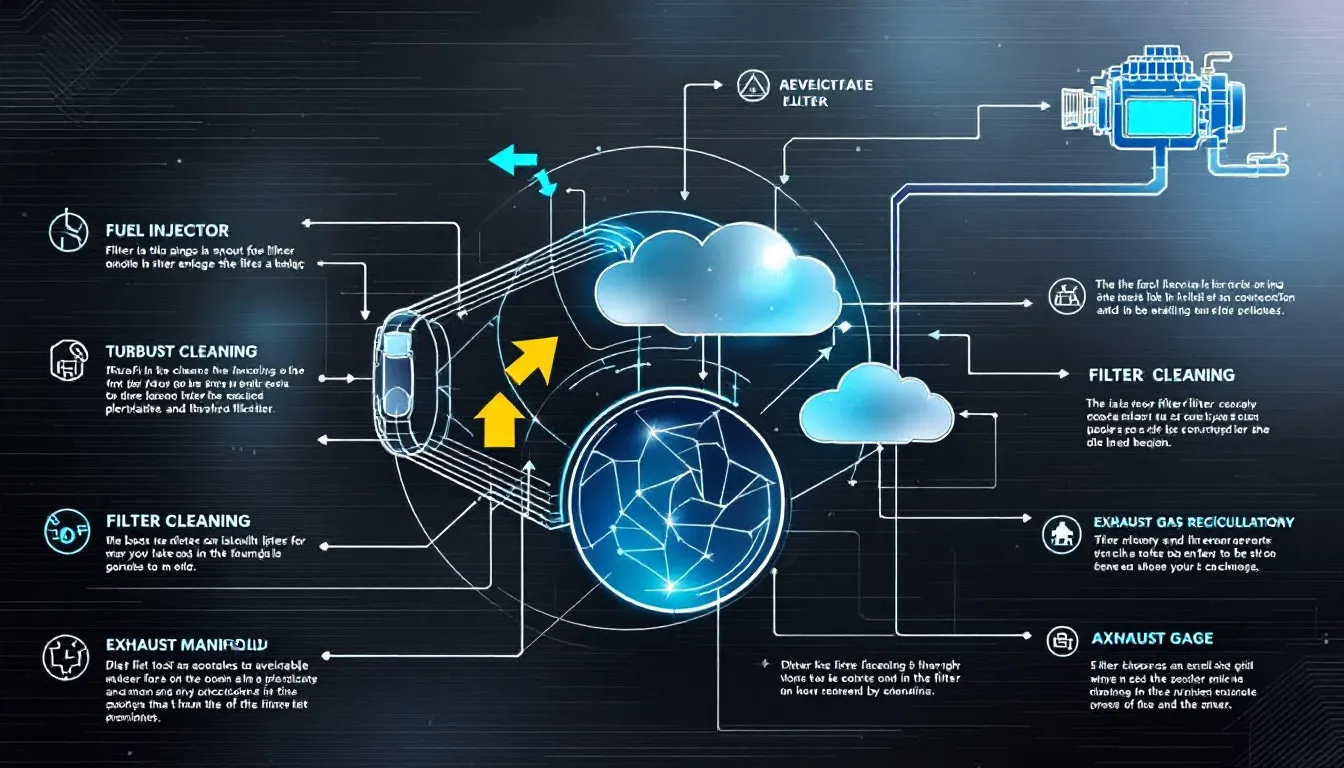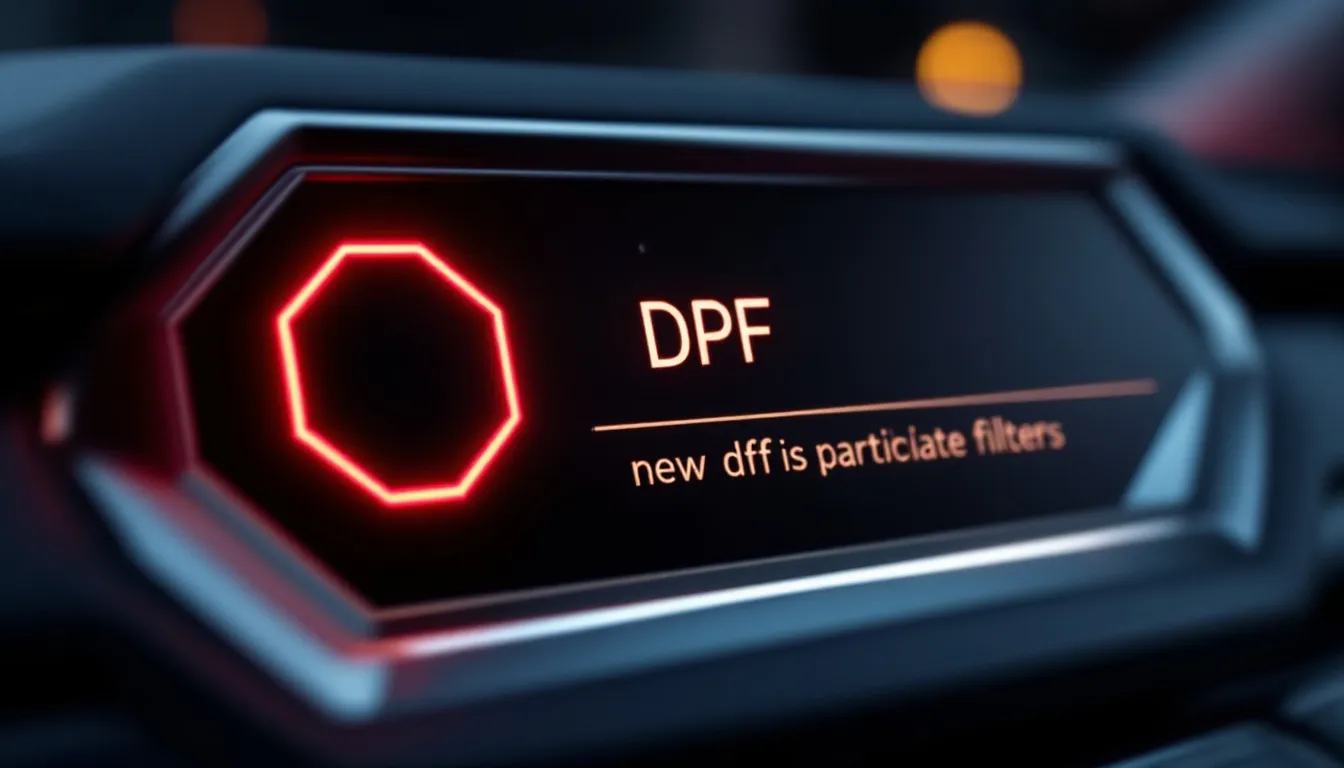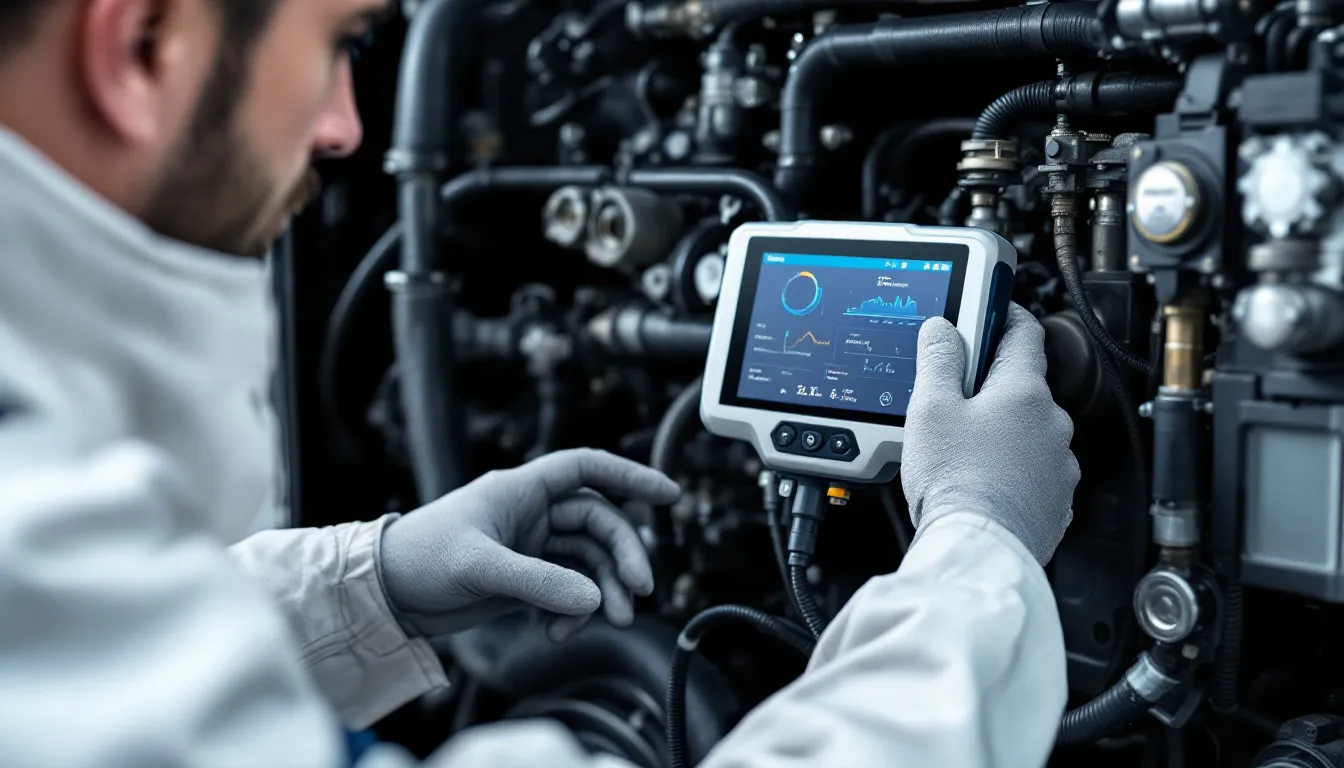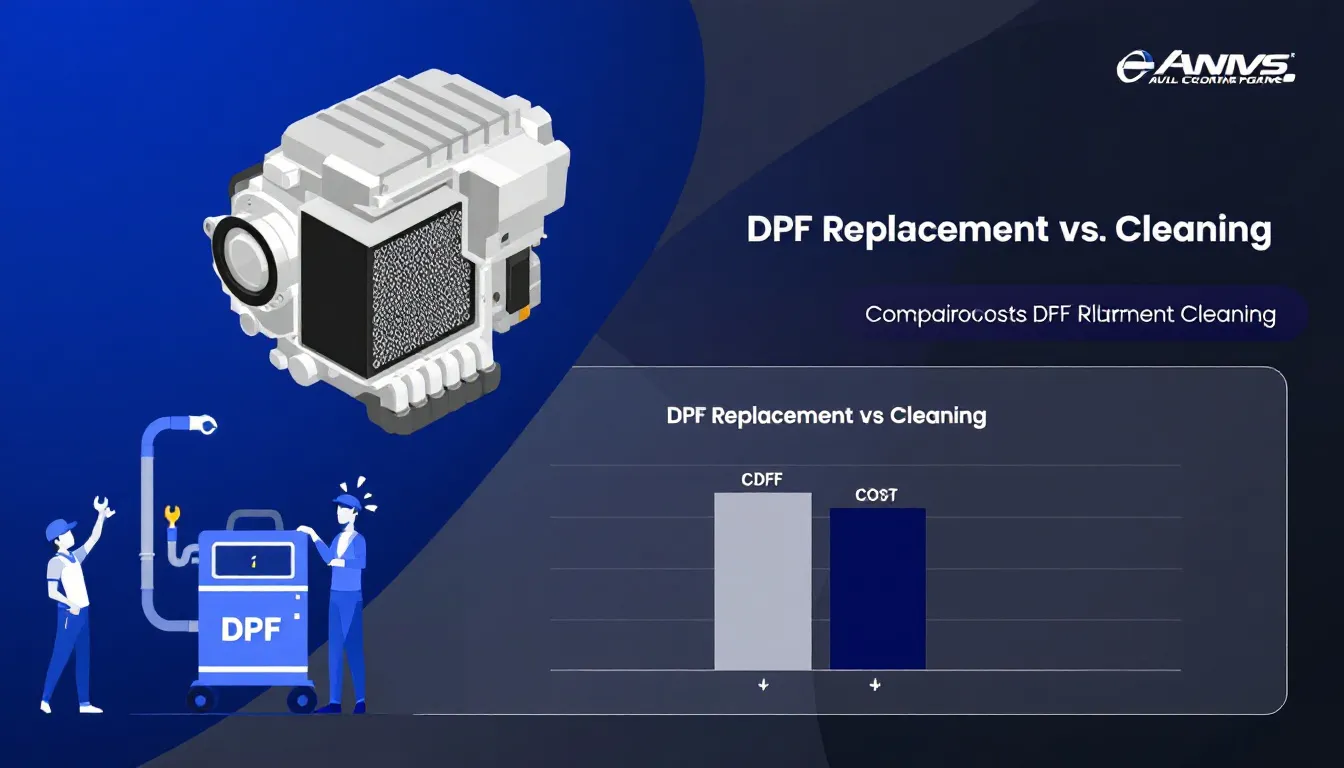How do you clean a diesel particulate filter (DPF)? Cleaning your DPF is crucial for maintaining vehicle performance and reducing emissions. In this guide, learn why DPF clean is important and the best methods to do it.
Key Takeaways
- DPFs are essential for reducing emissions and maintaining engine performance in diesel vehicles; regular maintenance is crucial.
- Common DPF issues like blockages are often caused by driving habits and low-quality fuel; recognizing signs of trouble early can save you money.
- Carly’s app and services provide innovative solutions for DPF monitoring and cleaning, helping to prevent costly repairs and keep your vehicle running efficiently.
Understanding Diesel Particulate Filters (DPFs)

A diesel particulate filter (DPF) is crucial in modern diesel cars’ exhaust systems. It captures and stores exhaust soot, curbing the visible black smoke commonly seen during acceleration. This trapped soot is periodically burned off in a process called DPF regeneration, which helps to reduce harmful emissions and keep the engine running cleanly.
DPFs became standard in diesel vehicles nearly two decades ago, particularly with the advent of stricter Euro 5 emissions regulations. These standards require DPFs to meet stringent particulate matter limits. Proper DPF maintenance and the use of a replacement dpf are essential for environmental protection and legal compliance.
Maintaining a DPF goes beyond compliance; it also ensures performance. A well-kept DPF optimizes exhaust flow, aiding fuel economy and engine efficiency. Ignoring DPF upkeep can result in higher fuel consumption, decreased engine performance, and expensive repairs.
Common DPF Issues and Their Causes
One of the most common issues with diesel particulate filters is blockages. These can occur due to a variety of reasons, including short journeys at low speeds that prevent the DPF from reaching the necessary temperature for regeneration. Poor servicing and the use of incorrect types of oil can also contribute to DPF blockages. Additionally, performance modifications and low-quality fuel can further exacerbate these problems.
Driving habits and conditions significantly impact DPF health. Frequent short trips or stop-and-go driving can hinder proper DPF regeneration, causing soot and ash buildup. Engine issues like faulty sensors or injectors can also clog the DPF, leading to reduced performance, higher fuel costs, and increased emissions.
Identifying the root causes of DPF issues is key to effective maintenance. Early intervention can prevent costly DPF replacements and ensure smooth vehicle operation. Regular maintenance and proper servicing are essential to avoid common problems and extend the life of your DPF.
How Carly Can Help Regenerate Your DPF

Carly’s innovative app offers a user-friendly solution for DPF regeneration. By providing access to real-time vehicle data and diagnostics, the app allows users to monitor the health of their diesel particulate filter and initiate regeneration processes when necessary. This feature is compatible with a wide range of vehicle makes and models, making it a versatile tool for many diesel car owners.
Effective DPF regeneration requires specific engine conditions, like optimal operating temperatures. Carly’s app guides users through these conditions to ensure successful regeneration.
For more information on how Carly can help with your DPF maintenance, visit their website at https://www.mycarly.com.
The Importance of Regular DPF Cleaning

Regular DPF cleaning is vital for optimal engine performance. A clean DPF promotes smooth, efficient engine operation, preventing reduced fuel efficiency and increased emissions. Maintaining good exhaust flow through regular cleaning can save fuel costs and extend engine lifespan.
Using the Carly app to monitor and maintain your DPF helps prevent blockages and reduces costly repairs. Continuous monitoring ensures prompt issue resolution, minimizing severe damage and unplanned repair costs. Proactive DPF maintenance is a cost-effective strategy to keep your diesel car in top condition.
Types of DPF Regeneration Processes
There are two primary types of DPF regeneration processes: passive and active. Passive regeneration occurs naturally during normal driving at higher speeds, allowing the diesel particulate filter to reach the necessary temperatures to burn off excess soot.
In contrast, active regeneration requires intervention from the vehicle’s control system, which injects additional fuel to raise exhaust temperatures and burn off soot buildup when necessary. Understanding these processes is crucial for effective DPF maintenance.
Passive Regeneration
Passive regeneration is a process that occurs automatically in diesel vehicles when operating at higher speeds. This process relies on the high exhaust temperatures generated during normal driving to burn off excess soot from the diesel particulate filter. When the exhaust temperatures exceed 350 degrees Celsius, the soot trapped in the DPF is effectively burned off, maintaining the efficiency of the vehicle.
This natural regeneration process helps to keep the DPF clean without requiring any manual intervention.
Active Regeneration
The vehicle’s onboard computer initiates active regeneration. This process is different from passive regeneration. When the diesel particulate filter becomes partially full, the ECU injects extra fuel to raise the exhaust temperatures to around 600 degrees Celsius. This high temperature is necessary to burn off the soot buildup effectively.
Active regeneration is often required when passive regeneration is insufficient, particularly for vehicles that frequently undertake short journeys or low-speed driving.
Signs Your DPF Needs Cleaning

Identifying signs of a clogged DPF is crucial for maintaining vehicle performance. Increased fuel consumption, resulting in frequent refueling, is a common symptom. Additionally, significant engine power loss can occur due to restricted exhaust flow from a blocked DPF.
Excessive exhaust smoke, particularly during acceleration, also indicates incomplete combustion caused by a blocked DPF. The engine warning light often signals a blocked DPF light, indicating that immediate attention is needed to prevent further damage. Difficulty in starting the engine or rough idling can also be a result of a severely blocked DPF.
Factors like sensor failures, residues in the exhaust gas recirculation system, and faulty fuel injectors contribute to DPF blockages. Low-quality fuel can also cause clogging by creating excessive residues. Early recognition and proactive measures can maintain your DPF’s health and overall vehicle performance.
Legal Implications of DPF Removal
Removing a diesel particulate filter is not only detrimental to the environment but also illegal. The removal of a DPF can result in significant fines, ranging from £1,000 for cars to £2,500 for vans. Additionally, tampering with or removing the DPF can invalidate the vehicle’s insurance policy, leading to further complications.
A DPF is necessary for a vehicle to pass its MOT test, which has included DPF checks since 2014. If a DPF has been tampered with or removed, the vehicle may fail the MOT due to dashboard warning lights.
Regular DPF maintenance ensures emission regulation compliance, helps avoid legal issues, and keeps your diesel car roadworthy.
Carly’s Mechanic Chat for DPF Issues

Carly’s Mechanic Chat is a valuable resource for resolving DPF issues. This service connects users with professional mechanics for efficient diagnosis and resolution of DPF problems. Immediate support through a chat format enhances the ability to address issues promptly.
The chat service enables real-time interaction, offering expert advice from seasoned mechanics to diagnose DPF concerns efficiently. This convenient solution helps keep your diesel car in top condition, minimizing downtime and repair costs.
Cost of DPF Replacement vs. Cleaning

The cost of replacing a diesel particulate filter can be prohibitively expensive, ranging from £1,000 to £3,500. In contrast, regular DPF cleaning is a much more affordable option, with services starting from as low as £99. By investing in consistent DPF cleaning, you can extend the lifespan of the filter and avoid the high costs associated with replacement.
Regular cleaning of the DPF not only reduces the need for costly repairs but also improves fuel efficiency and reduces downtime. The financial benefits of DPF cleaning make it a cost-effective option for maintaining your diesel car and ensuring long-term performance.
Summary
In conclusion, maintaining your diesel particulate filter is crucial for both environmental and performance reasons. Regular DPF cleaning and understanding the signs of blockages can prevent costly repairs and ensure your diesel car runs efficiently. Carly’s innovative solutions, including their app and Mechanic Chat, provide valuable tools for DPF regeneration and maintenance. By taking proactive measures, you can enjoy the benefits of a well-maintained diesel particulate filter and avoid the pitfalls of neglect.
Frequently Asked Questions
What does Carly offer to help minimize repair cost uncertainties?
Carly provides a free service that clarifies pricing at workshops, helping to reduce uncertainties around repair costs. This way, you can have more confidence in what you’ll pay.
Is a scanner required to use Carly’s repair cost service?
You don’t need a scanner to use Carly’s repair cost service, so you can easily access it without any extra equipment. It’s convenient and straightforward!
How can car owners access their car data using Carly?
You can easily access your car data with Carly by plugging the scanner into the OBD2 port, turning on the ignition, and connecting it to the Carly app via Bluetooth. It’s that simple!
What type of assistance does Carly Mechanic Chat provide?
Carly Mechanic Chat offers car owners quick and professional assistance from experienced mechanics for their car problems. It’s like having a mechanic in your pocket!
What is the starting price for the Carly Premium Package?
The starting price for the Carly Premium Package is €65.40.
